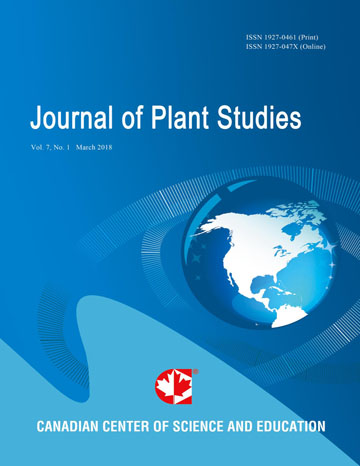Analysis of mRNA Levels of Ten Genes Under Water Stress in Triticum turgidum subsp. durum
- Marouane Melloul
- Driss Iraqi
- Sripada Udupa
- Gilles Erba
- My Abdelaziz Alaoui
- Mohammed Ibriz
- Elmostafa Fahime
Abstract
Drought is one of the major causes of dramatic yield loss in crop plants. Plants perceive and respond to stress. Upon perception of stress, a signal is communicated to downstream components resulting in change of gene expression and thereby of proteins required for the initial damage-repair and physiological re-programming for better adaptation. In this work, a set of 10 genes from Triticum turgidum subsp. durum, were tested for their expression under drought conditions. These drought responsive genes selected for expressional analyses can be classified into two groups. The first group includes functional proteins already known to be involved in the response to water stress such as late embryogenesis protein. The second group comprises protein factors involved in the regulation of signal transduction and gene expression, such as transcription factors. We have used the real-time quantitative PCR to monitor the expression patterns of these 10 genes in Triticum durum leaves under drought stress. The results showed a high quantitative up-regulation of some genes belonging to dehydrin, transcription factors (DREBS), cell wall polysaccharides and regulation of secretion categories. Moreover, the actin binding protein and an ethylene-responsive element binding factor genes were slightly down-regulated and not significantly affected by the drought stress. The result of this study extended our knowledge of drought induced genes and may provide better understanding of the molecular mechanisms of drought response inTriticum durum. Identifying genes turned on or off in response to water stress will help in enhancing drought tolerance and providing genes that can be tested by many biotechnology-based approaches. The long term objective of this study is to choose the optimum condition for subsequent whole transcriptomic analysis by cDNA-AFLP.
- Full Text:
 PDF
PDF
- DOI:10.5539/jps.v3n1p65
Index
- AGRICOLA
- CAB Abstracts
- CABI
- CAS (American Chemical Society)
- CNKI Scholar
- Elektronische Zeitschriftenbibliothek (EZB)
- Excellence in Research for Australia (ERA)
- Google Scholar
- JournalTOCs
- Mendeley
- Open policy finder
- Scilit
- Standard Periodical Directory
- Technische Informationsbibliothek (TIB)
- WorldCat
Contact
- Joan LeeEditorial Assistant
- jps@ccsenet.org
